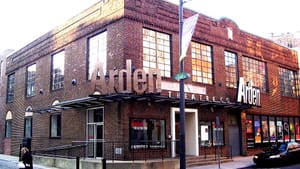Stay in the Loop
BSR publishes on a weekly schedule, with an email newsletter every Wednesday and Thursday morning. There’s no paywall, and subscribing is always free.
The show must go on
'Under the Skin' at the Arden: An interview with Terrence Nolen

“We have more than we need.”
In this age of excess, you don’t often hear a line like that, especially from the stage. For that reason — and many others — Under The Skin, Michael Hollinger’s touching new play about what it means to have and to give, is a gem of a play that is a gift in itself.
The play tells the story of Raina, a young woman faced with a moral, ethical, and personal dilemma: Should she donate one of her kidneys to her ailing father, from whom she’s been estranged for years? It’s a matter of life and death for the cantankerous Lou, who is pressuring his daughter even though he neglected her and abandoned her late mother.
For the emotionally scarred Raina, however, it’s a matter of principle. How can she give to someone who has given nothing to her — and put herself (a single parent with responsibilities) at risk in the process? “I want to be the kind of person who would,” she explains to us, in one of the play’s many direct addresses. But she’s not there yet. So she starts a list of pros and cons. “I have to know you’re kidney-worthy,” Raina challenges her father.
A series of gripping scenes (and revelations) ensue between daughter, father, and other compelling characters in this taut tale of family conflict, and director Terry Nolen guides an agile ensemble of four (playing multiple roles) with clarity, skill, and grace.
Unscripted drama
But another story — an unscripted one — unfolded while the play was premiering at the Arden. On the second press night performance, the actor playing Lou took ill, and at intermission, Nolen (who is also Arden’s artistic director) rushed him over to Jefferson Hospital, instructing the stage manager to announce to the audience that there would be a “hold.” Forty minutes later, Nolen reappeared. He walked onstage and explained the situation to an understanding audience, who sat rapt through Act Two while Nolen himself took over in the lead role of Lou, script in hand.
“I hadn’t been onstage since college,” Nolen explained, “so I didn’t try to do anything more than tell the story.” How was the experience for him, in retrospect? “It was fascinating to sit up there. ‘The cues sound good from here,’ I told my sound designer.”
The next day, Douglas Rees, a veteran of Hollinger’s plays and the Arden stages, took over the role of Lou and appeared script–in-hand over a four-show weekend. Nolen postponed the official opening for another week, to allow Rees to settle into the role. “Everyone was incredibly generous. Given what the play is about, it made it especially rewarding.” Hollinger adds: “It’s disorienting when a family [i.e., cast] member is lost, and the bonding was so meaningful. It’s a lesson in how people rally and pull together.”
Saving the day
When asked about his courageous performance (as director, crisis manager, and “accidental actor”), Nolen remains self-effacing, but according to Hollinger, he saved the day. This is their seventh collaboration as director and playwright, and testimony to the strength of their artistic relationship. Currently in its second month of performance, the ensemble (Julianna Zinkel, Biko Eisen-Martin, Alice M. Gatling, and now Rees) is solid and seamless under Nolen’s expert direction.
Meanwhile, Hollinger is on to his next project: Italian Lessons with Signor Da Ponte, a one-man show starring Mozart’s librettist. Hollinger’s growing oeuvre features a dazzling array of varied topics and time frames, ranging from ghostwriting in the early 20th century (Ghost-Writer), competition among members of a string quartet (Opus), scientists and fishermen in the Galapagos (Tooth and Claw), marriage “and other explosive devices” (Red Herring), to relic manufacturing in a medieval monastery (Incorruptible). He’s a writer of Stoppardian intellect, Shavian optimism, and Chekhovian heart.
Reprising themes
Speaking of Under the Skin and another of his plays, An Empty Plate in the Café du Grand Boeuf (about a wealthy American starving himself in a gourmet restaurant), Hollinger muses: “I’ve been writing about abundance and scarcity for a while. Your heart tends to work over the same themes.”
Another recurrent Hollinger theme is that of connection. “I want to feel connected with you,” Raina tells her father. Hollinger and Nolen say they will always feel a special connection to Under the Skin, its cast, and Craig Spidle, the original actor who played Lou (now fully recovered).
Meanwhile, Hollinger wants to be clear about his play’s central metaphor. “This story is not about kidneys,” Raina tells us. “It's about another kind of organ — the human heart.”
For Naomi Orwin’s review of Under the Skin, click here.
What, When, Where
Under the Skin, by Michael Hollinger, directed by Terrence J. Nolen. Through March 15 at the Arden Theatre Company, 40 North 2nd Street, Philadelphia. www.ardentheatre.org.
Sign up for our newsletter
All of the week's new articles, all in one place. Sign up for the free weekly BSR newsletters, and don't miss a conversation.
